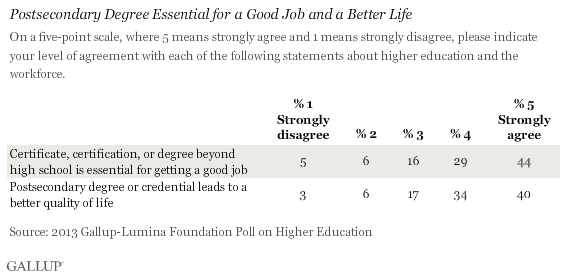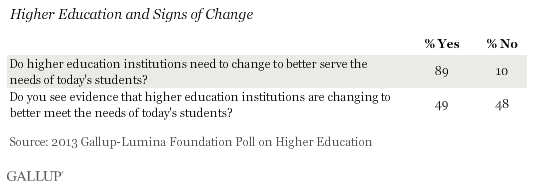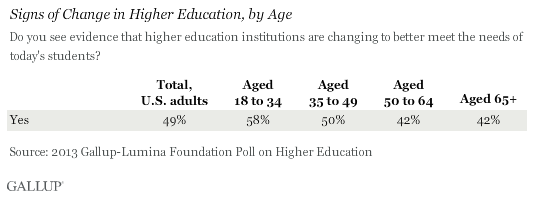This article is part of a weeklong series analyzing how education leaders, students, and teachers evaluate education in America. The series will feature Americans' opinions on topics such as the Common Core, a uniform set of academic skills and competencies in U.S. schools; the quality of public K-12 education; the level of respect for U.S. teachers; and the viability of online higher education.
WASHINGTON, D.C. -- Americans believe in the importance of postsecondary education, with more than nine in 10 (94%) saying a postsecondary degree or credential is at least somewhat important and 70% saying it is very important, similar to last year's findings. However, most also say higher-education institutions must evolve to better serve the needs of today's students.

These results are from a Nov. 25-Dec. 15, 2013, study by Gallup and the Lumina Foundation with a random sample of U.S. adults. While Americans in every age group are equally likely to see the importance of higher education, more than three-quarters (77%) of those who have completed postsecondary education themselves say it is very important to attain a certificate or degree, compared with 60% who have some college experience and 66% who have a high school diploma or less education.
Postsecondary Certificate or Degree Essential for Good Job and Good Life
Americans value higher education at least partly because of the perception that it opens the door to wider career opportunities and an improved standard of living. Nearly three in four Americans (73%) agree or strongly agree that having a certificate, certification, or degree beyond high school is essential for getting a good job. Furthermore, most U.S. adults (74%) see having a postsecondary degree or credential as a pathway to a better quality of life.

American Public Says Higher Education Institutions Need to Change
While the majority of Americans believe postsecondary degree attainment is vital to living a good life in this country, most -- 89% -- say higher education institutions need to change to better serve the needs of today's students. At this point, about half (49%) of U.S. adults see evidence that such change is actually happening.

Americans aged 18 to 34 -- those closest to traditional college age -- are the most likely to say they see signs of change (58%), compared with 50% of those aged 35 to 49 and 42% of those 50 or older.

Implications
Today's postsecondary graduates often leave school deeply in debt and with relatively limited prospects for high-paying work. Still, most U.S. adults believe that a postsecondary degree or certificate is the key to a better job and a better quality of life, with the caveat that reforms are needed to make the current system more conducive to students' needs.
To hold their value in Americans' eyes, colleges and universities may consider focusing on preparing students for good careers that will improve their lives without overburdening them with debt. This may mean redesigning higher education to make it more affordable and accessible. Stronger collaboration between businesses and academic institutions may help students gain the real-world skills they need to get hired.
Reforms like these may be already underway at some institutions, as about half of Americans report seeing some evidence of change. However, with nearly nine out of 10 U.S. adults saying the higher-education system needs to evolve, more work could be done to align these institutions to the demands of the 21st-century workforce.
Survey Methods
Results from the study are based on telephone interviews conducted as part of the Gallup-Lumina Foundation Poll on Higher Education Nov. 25-Dec. 15, 2013, with a random sample of 1,012 adults, aged 18 and older living in all 50 U.S. states and the District of Columbia.
For results based on the total sample size of 1,012 adults, one can say with 95% confidence that the margin of error attributable to sampling and other random effects is ±4 percentage points. For subgroups within this population (e.g., education level, gender, and income), the margin of error would be greater.
Interviews are conducted with respondents on landline telephones and cellular phones. Interviews were conducted in English only. Each sample of national adults includes a minimum quota by region. Landline and cellular telephone numbers are selected using random-digit-dialing. Landline respondents are chosen at random within each household on the basis of which member had the most recent birthday.
Samples are weighted to correct for unequal selection probability, nonresponse, and double coverage of landline and cell users in the two sampling frames. They are also weighted to match the national demographics of gender, age, race, Hispanic ethnicity, education, region and phone status (cellphone only/landline only/both, and cellphone mostly). Demographic weighting targets are based on the most recent Current Population Survey figures for the aged 18 and older U.S. population. Phone status targets are based on the most recent National Health Interview Survey. All reported margins of sampling error include the computed design effects for weighting.
In addition to sampling error, question wording and practical difficulties in conducting surveys can introduce error or bias into the findings of public opinion polls.
For more details on Gallup's polling methodology, visit www.gallup.com.
